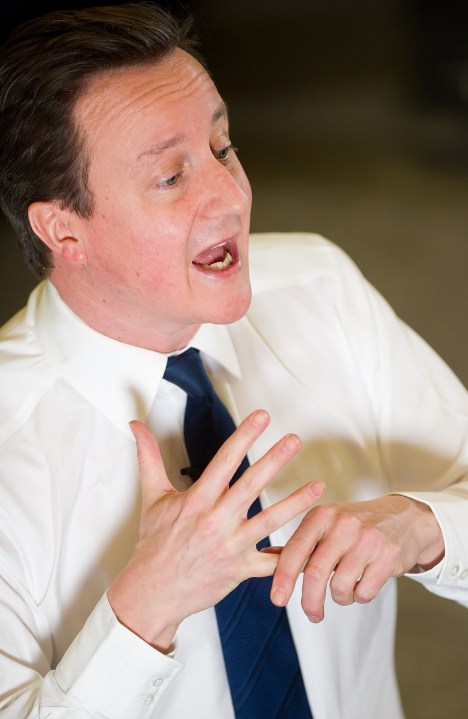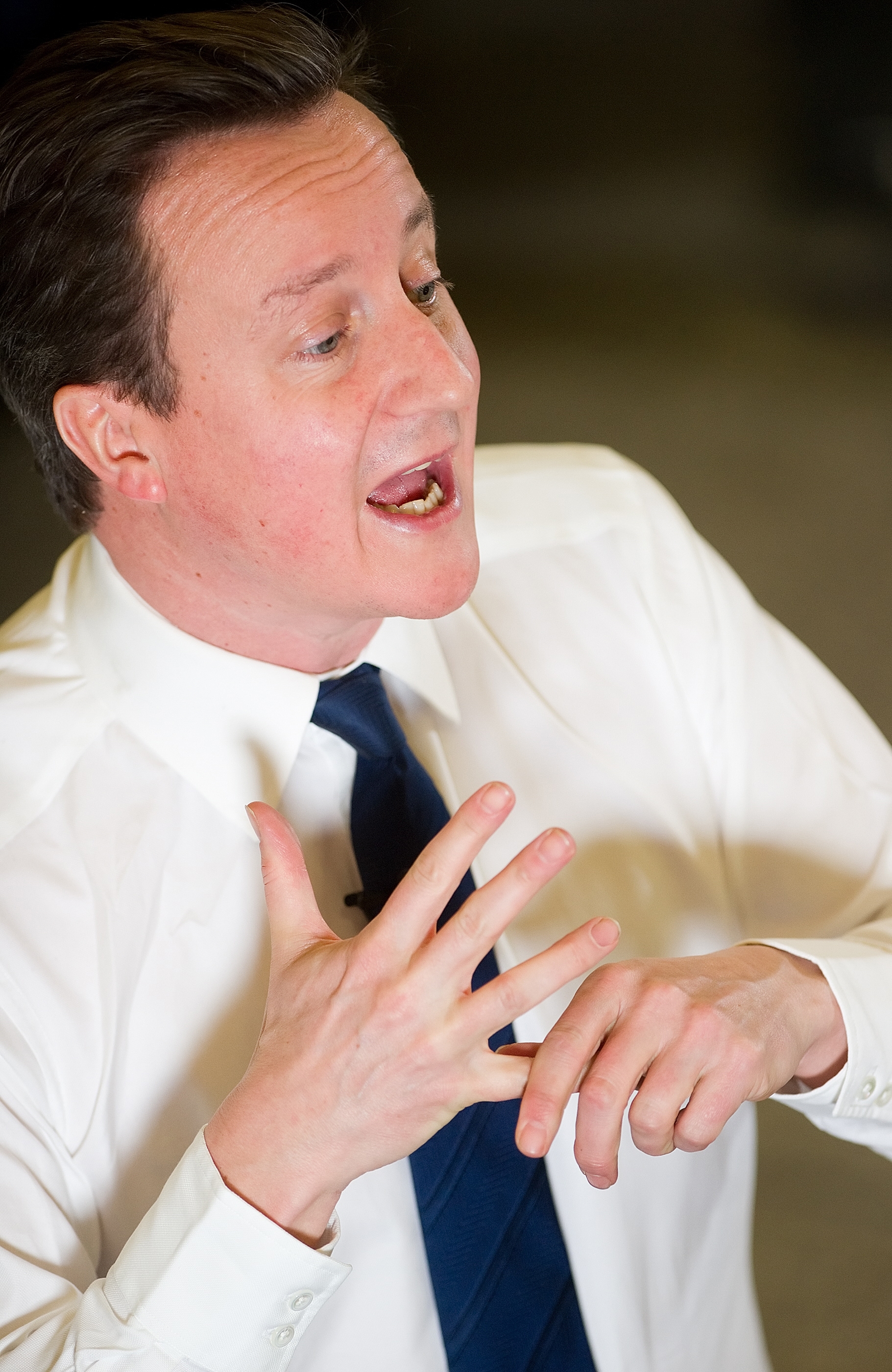 David Cameron was on Marr this morning (with yours truly doing the warm-up
paper review), talking about the “tough and difficult year” ahead. Others have been through the interview for its general content. What interested me was its economic content: not the
most sexy subject in the world, I know, but, as Alan Johnson unwittingly demonstrated
on Sky this morning, the Labour Party looks unable to scrutinise the government’s economic policy. Anyway, here are ten observations:
David Cameron was on Marr this morning (with yours truly doing the warm-up
paper review), talking about the “tough and difficult year” ahead. Others have been through the interview for its general content. What interested me was its economic content: not the
most sexy subject in the world, I know, but, as Alan Johnson unwittingly demonstrated
on Sky this morning, the Labour Party looks unable to scrutinise the government’s economic policy. Anyway, here are ten observations:
1) “Because of the budget last year, we are lifting 800,000 people out of income tax, we’re raising income tax thresholds. That will help all people who are basic rate
taxpayers.” Thanks to the Lib Dems. But it’s a great claim, and I’m glad Cameron is making it. A solid achievement by his coalition government.
2) On VAT: “Putting up any tax has an impact on the economy – what would be the impact of not dealing with the deficit?” A good way of phrasing it, but it’s not a
binary choice. The VAT rise was not needed for deficit reduction: it was used to pay for extra tax credits to assuage the Lib Dems and flatter those dumb decile graphs. Cameron’s lucky that no-one
points this out, least of all a malfunctioning Labour party.
3) Marr: “Does the same go for the 50p top rate of income tax? Is that also forever and a day?” Cameron: “I hope not because you know we’ve obviously got to look at
how much this thing is raising.” He is teasing, of course. When he says “I hope not,” he means “no way, Jose”. Osborne told The Spectator before Christmas, “I’ll make it clear again: this is
a temporary feature of our tax system.”.
4) “So I don’t think any party in this country wants it to be permanent.” Again, he’s teasing! Of course he knows that Ed Miliband has said that the 50p tax should be permanent and here “for the foreseeable future”.
5) “But let’s see if this tax is raising any money.” Fairly soon, someone from the Treasury needs to brief Cameron on this. Such an assessment is notoriously hard, and
possible, really, only many years after when the damage would have been done. Sure, next year’s data will show the number of highest-rate taxpayers collapsing – and the taxable income of
those who remain falling. But how much is due to their declaring income somewhere else, and how much the general downturn? It’s impossible to separate. California found this after their 2002 hike
in the top tax rate. The number of taxed millionaires collapsed, but how much of that was to do with the dot-com crash? Best you can do is a longitudinal study in five years’ time, comparing the UK
with data from other countries. By which time, the golden geese will have flown. Or look at the high-tax experiment backfiring in Oregon now.
I do hope someone has explained all this to Cameron. If he’s saying this for political cover, fine. But you get the feeling that, because 50p is a political decision, no-one around Cameron has
looked in any depth at the economic damage it can cause: £4.5bn a year in lost revenue, according to a TPA study for The Spectator.
6) “What we have to work out is: are the rich paying a fair share?” The latest figures show that the richest 1 percent in Britain paid 23 percent of all income tax
collected. A statistic to warm the heart of the most ardent redistributionist.
7) “I think everybody knows that high rates of marginal income tax discourage people from working, discourage people from living here, discourage people from getting
on…. When the high rates of income tax were cut back in the 1980s, what we found was not only did the richest 10 percent pay more in tax. They actually paid a greater percentage of the tax.
So that’s I think the argument” Exactly! So, follow that logic, and what happens if you increase the upper rate? The richest pay less in tax, and a lower percentage of the tax. Cameron
evidently grasps this, which makes it all the more baffling why he allowed Osborne to fall into Brown’s 50p booby trap:

My problem with the 50p tax is not just that it’s self-defeating, a move so fiscally stupid that no one outside Reykjavik is copying it. It’s that the Tories have embraced 70s-style ‘tax the
rich’ economics – as a tactical move, to stop Brown accusing them of abolishing the tax – without giving serious thought to the consequences. Even Brown understood the destructive power
of the 50p tax, which is why he didn’t introduce it until the last 24 days of his 13 years in Downing St. He bet that the Tories would lack the intellectual self-confidence to argue that it doesn’t
raise money – they’d be too scared of being called names like ‘bankers’ mates’. And, alas, he bet correctly. But Cameron showed today how to argue against such false
economic logic: he did so effortlessly, and convincingly.
8) “I want to see the bonus pool smaller than last year” – why? The Exchequer gets 51.5 percent of this via tax. As I argue
in the News of the World (£) today, a £7bn bonus pool means £3.6bn tax haul – enough, if banked, to offset the defence cuts. But I’ll accept that this is, perhaps, the most
unpopular argument you can make right now.
9) “It’s an easy scapegoat to pick one industry [i.e. banking]. Governments made mistakes, regulators made mistakes, politicians made mistakes. Everyone was involved. Even
oppositions made mistakes, dare I say it.” Good to see him stand up for the banks – and having the maturity to confess to mistakes of his own. Marr didn’t press him, but I imagine he
meant signing up to Brown’s ruinous spending plans and failing to spot the asset bubble. This confession was volunteered, and it is a mark of Cameron’s confidence and credibility.
10) “By and large, they [The Bank of England] have done a good job [on inflation targeting] since they were given that job…. ” He’s being too kind. The Bank has missed
the 2.0 percent CPI target for four of the last five years (see graph, below) and, crucially, the public has lost confidence in its ability to control inflation (as last week’s YouGov/Citi survey showed). The public, and buyers of British gilts, believe that the Bank has failed – and this is, itself, an
inflationary reality which Cameron will have to deal with.

This whole interview made me think, yet again, that David Cameron is his own greatest weapon. His instincts are correct, he can sell the right policies well. Nowadays, when Tony Blair is asked what
he regrets about his time in office he says, “I wish I had listened to myself more”. I wish Cameron would listen to himself more. He is his own best adviser. He instinctively knows the
futility of high tax rates, and he can explain and sell complex conservative arguments better than anyone who works for him. Resolution for 2011: go with his own instincts.








Comments